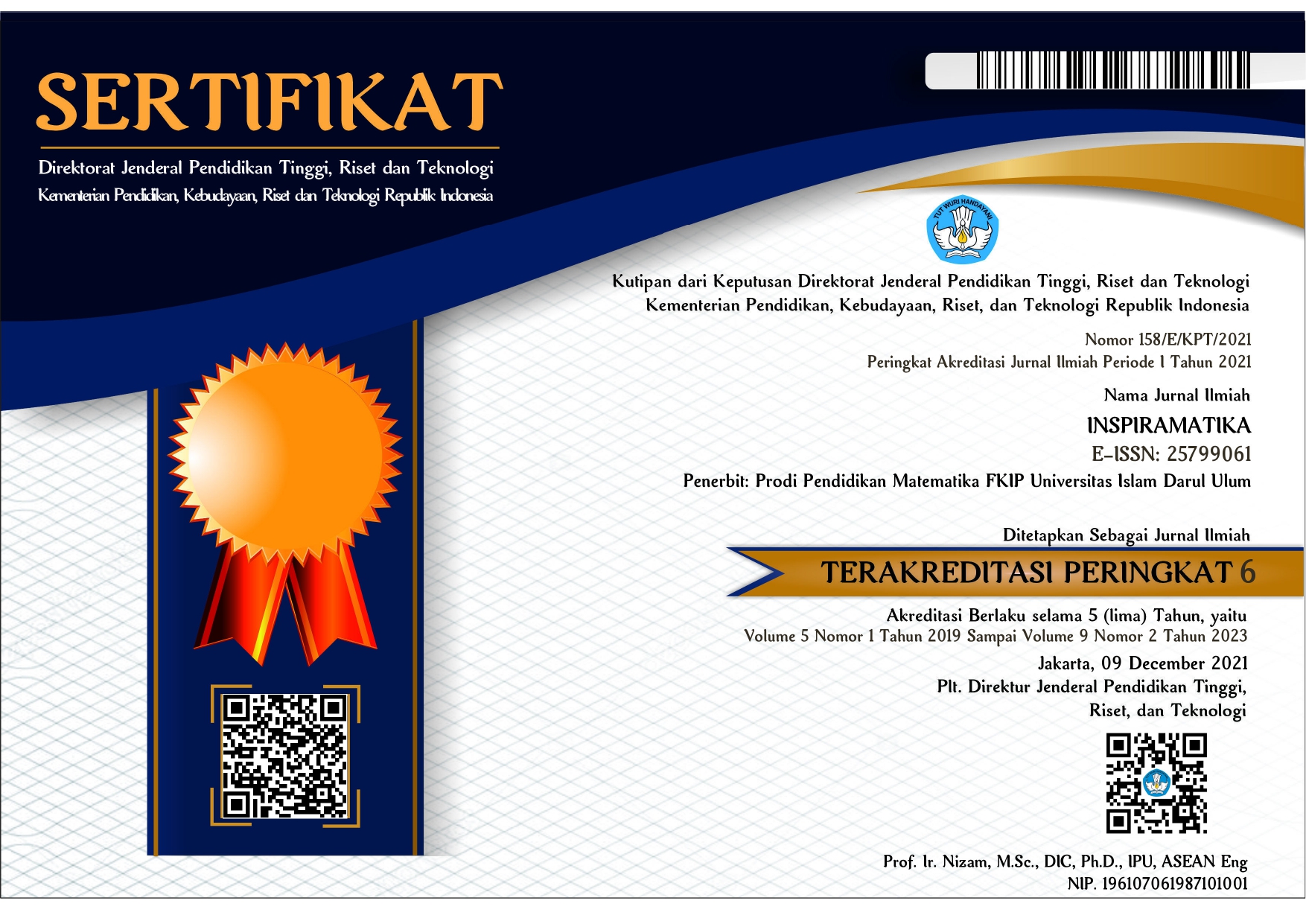ANALISIS KEMAMPUAN BERPIKIR KRITIS SISWA DALAM MENYELESAIKAN SOAL HOTS DITINJAU DARI KECERDASAN LOGIS MATEMATIS
Abstract
This research aims to describes the critical thinking ability of students in solving HOTS problems with high, medium, and low mathematical logic intelligence. This research is a descriptive research with a qualitative approach. The subjects of this research were 6 students of VIII-A grade at SMP Negeri 1 Deket in the 2019/2020 academic year. The determination of the subject was based on the result of the mathematical logic intelligence test. The instrument that was given to the research subjects consisted of a description test consisting of 2 questions. The data used are test results and the results of interview interviews. Based on the analysis of the data that has been done, the results of this research indicate that: (1) the critical thinking ability of students in solving HOTS problem with high mathematical logic intelligence indicate that students can fulfill four indicators of critical thinking ability, namely interpretation, analysis, evaluation, inference, and included in TKBK 4 (very critical); (2) the critical thinking ability of students in solving HOTS problem with medium mathematical logic intelligence indicate that students can fulfill three indicators of critical thinking ability, namely interpretation, analysis, evaluation, and included in TKBK 3 (critical); (3) the critical thinking ability of students in solving HOTS problem with low mathematical logic intelligence indicate that students can fulfill one indicator of critical thinking ability, namely interpretation and included in TKBK 1 (less critical).
Downloads
References
Hidayanti, Dwi, dkk. “Analisis Kemampuan Berpikir Kritis Siswa SMP Kelas IX pada Materi Kesebangunan”. Prosiding Konferensi Nasional Penelitian Matematika dan Pembelajarannya (KNPMP I), Surakarta, 12 Maret 2016.
Jannah, Raodatul. 2011. Membuat Anak Cinta Matematika dan Eksak Lainnya. Yogyakarta: Diva Press.
Kempirmase, Feronika, dkk. “Kemampuan Berpikir Kritis Siswa dalam menyelesaikan Soal-Soal Higher Order Thinking Skill (HOTS) pada Materi Barisan dan Deret Aritmatika di Kelas XI SMA Negeri 10 Ambon”, Prosiding Seminar Nasional Pendidikan Matematika Universitas Pattimura. Agustus 2019, 1, hal. 21 – 24.
Kusumawardani, Linda, dkk. “Identifikasi Berpikir Kritis Siswa dalam Pemecahan Masalah Matematika pada Pokok Bahasan Segitiga”, Artikel Ilmiah Mahasiswa. Desember 2015, 1, hal. 1-6.
Parasamya, Cut Eka dan Agus Wahyuni. “Upaya Peningkatan Hasil Belajar Fisika Siswa melalui Penerapan Model Pembelajaran Problem Based Learning (PBL)”, Jurnal Ilmiah Mahasiswa (JIM) Pendidikan Fisika. Januari 2017, 2, hal. 42-49.
Pratiwi, Juwita Ayu, dkk. “Kemampuan Berpikir Kritis Aspek Analysis Siswa di Sekolah Menengah Atas”, Jurnal Pendidikan dan Pembelajaran Khatulistiwa. Desember 2016, 5, hal. 1-12.
Rahmawati, Farida. 2017. Meningkatkan Keterampilan Berpikir Kritis tentang Sifat-Sifat Bangun Ruang dengan Menerapkan Tipe Numbered Heads Together Pada Siswa Kelas V SD Negeri Balerejo 01 Kebonsari Madiun Tahun Pelajaran 2010/2011. Skripsi Sarjana. Surakarta: Fakultas Keguruan dan Ilmu Pendidikan Universitas Sebelas Maret Surakarta.
Shodikin, A. 2014. Strategi abduktif-deduktif pada pembelajaran matematika dalam peningkatan kemampuan Penalaran siswa SMA. Edusentris, 1(2), 103-116.
Shodikin, A., Purwanto, P., Subanji, S., & Sudirman, S. 2021. Students’ Thinking Process When Using Abductive Reasoning in Problem Solving. Acta Scientiae, 23(2), 58-87.
Yunita, Nindya Wulan, dkk. 2018. Analisis Kemampuan Berpikir Kritis Siswa dalam Menyelesaikan Soal Aritmetika Sosial dalam Pembelajaran Berbasis Lesson Study for Learning Community ditinjau dari Kecerdasan Logis Matematis. Kadikma, 9(1), 1-10.
Faridah, L., & Nasikhah, A. (2019, January). Improve Critical Thinking Ability and Mathematical Representation of Junior High School Students Throught Soft-skill Based Metacognitive Approaches. In International Conference on Science, Technology, Education, Arts, Culture and Humanity-" Interdisciplinary Challenges for Humanity Education in Digital Era"(STEACH 2018) (pp. 73-76). Atlantis Press.

This work is licensed under a Creative Commons Attribution-ShareAlike 4.0 International License.







.png)




